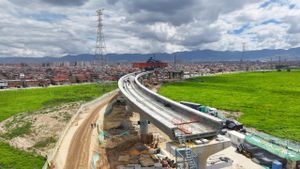The political climate in Brazil has heated up once again, as the Procuradoria-Geral da República (PGR) has announced charges against former President Jair Bolsonaro for serious allegations relating to attempted coup and other crimes. The PGR officially brought these charges to light on February 18, 2025, with far-reaching consequences for the political future of Bolsonaro and possibly the stability of Brazilian democracy itself.
This remarkable turn of events follows lengthy investigations by the Polícia Federal, which concluded Bolsonaro's involvement as the leader of what they describe as an organized criminal group aimed at subverting the democratic process. According to the prosecutor-general, Paulo Gonet, Bolsonaro and his accomplices sought to prevent the 2022 presidential election results from being recognized, thereby striving to extend his own rule.
Senator Randolfe Rodrigues expressed his views on this significant announcement, stating, "Finally, Bolsonaro has been charged. This organization aimed to prevent the 2022 election results from taking effect." The charges include armed criminal organization, violent abolition of the State of Law, and coup d'état, all of which are part of a broader attempt to undermine democratic governance.
According to the indictment, Bolsonaro has been accused of formulating and disseminated alarming disinformation about Brazil's electoral system, dating as far back as 2019. The aim was to create doubt around the integrity of the election process, fostering the narrative of fraud to set the groundwork for potential illegal actions once his presidency was on the line.
Notably, the repercussions of these accusations are severe. If convicted, Bolsonaro faces up to 28 years of imprisonment. The charges have sparked sharp reactions across the political spectrum, with some denying the legitimacy of the allegations. Flávio Bolsonaro, the former president's son and senator, dismissed the whole process as "an empty denunciation without proof against my father," reflecting the defense's stance on the accusation.
Critics, on the other hand, are adamant about the accountability of Bolsonaro and his circle. Lindbergh Farias, another prominent political figure, proclaimed, "This group attempted to stage this coup and must be punished." Many within his party are rallying behind the idea of thorough prosecution without amnesty for any parties involved, showcasing the urgency surrounding the matter.
Bolsonaro is not alone. The indictment includes charges against 33 other individuals, including significant military leaders and former ministers, indicating the alleged extensive reach of the criminal conspiracy. Highlighted figures include former Minister of Justice Anderson Torres, and General Augusto Heleno, demonstrating the broadening scope of this investigation.
Significantly, the destabilizing actions allegedly culminated during events on January 8, 2023, when Bolsonaro supporters, believing the election had been stolen, stormed Brazil's presidential palace, Congress, and Supreme Court. This violent protest was aimed at achieving the same ends for which Bolsonaro is being charged, showcasing the real-world consequences of the disinformation campaign launched under his leadership.
Political allies of Bolsonaro have dismissed the findings as orchestrated attacks on his political history, asserting unfounded claims about biases within the investigations. Congressman Zucco, representing the opposition, stated, "We reject any attempt to criminalize his political history and denounce this action as selective with motivations beyond legal grounds. We will remain vigilant."
Adding fuel to the fire, Bolsonaro and his supporters are now pushing for legislative changes to seek amnesty for those involved during the January 8 events. There is speculation about also altering the Ficha Limpa Law, which could allow Bolsonaro to run for office again by lifting his current status of inelegibility following these legal troubles.
While it remains to be seen how the Supreme Court will handle the PGR's allegations, the political stakes have never been higher. The PGR's recent charges against Bolsonaro signal both political division and the potentially long-term effects on the Brazilian democratic framework. The exploration of these allegations not only illuminates the current state of Brazilian politics but also poses significant questions about future governance and democratic integrity.
With the gravity of the situation, as Brazil moves forward, it must grapple with the lessons of democracy itself and the accountability of its leaders. This case could serve as a pivotal moment for political reform and the legal architecture surrounding Brazil's governance, as the nation watches closely to see what the outcome will be for Bolsonaro and the allied political figures.



